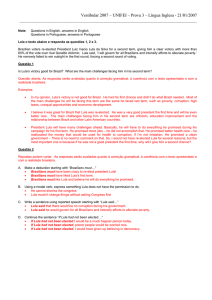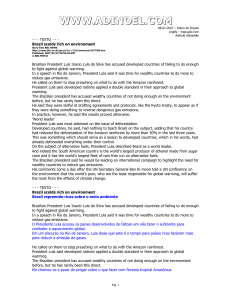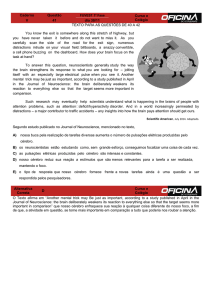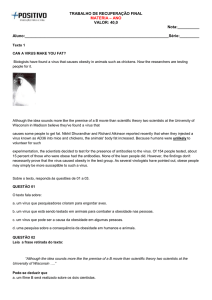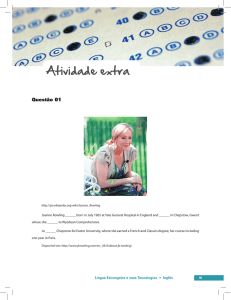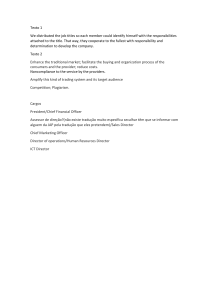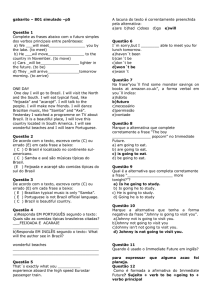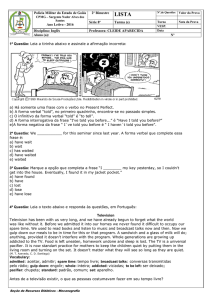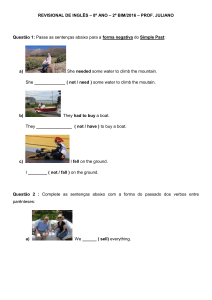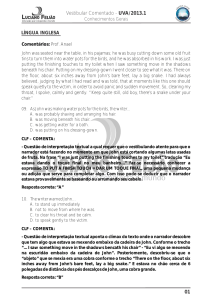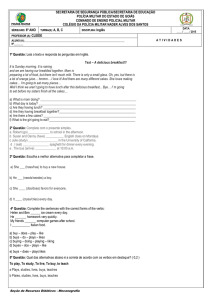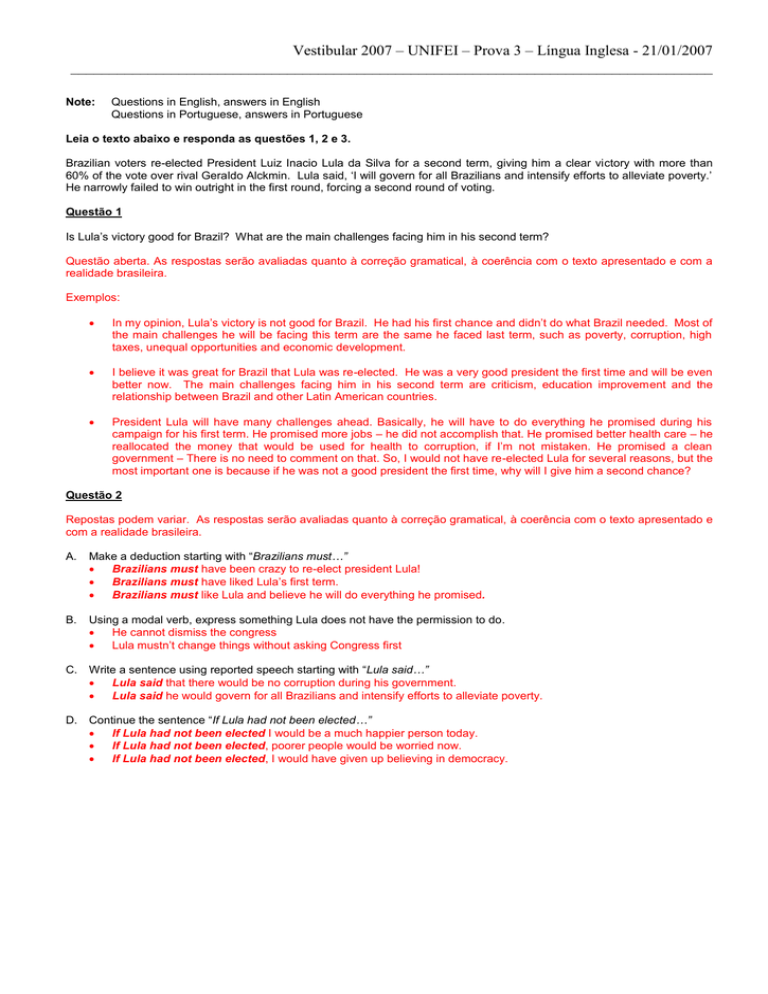
Vestibular 2007 – UNIFEI – Prova 3 – Língua Inglesa - 21/01/2007
___________________________________________________________________________________
Note:
Questions in English, answers in English
Questions in Portuguese, answers in Portuguese
Leia o texto abaixo e responda as questões 1, 2 e 3.
Brazilian voters re-elected President Luiz Inacio Lula da Silva for a second term, giving him a clear victory with more than
60% of the vote over rival Geraldo Alckmin. Lula said, ‘I will govern for all Brazilians and intensify efforts to alleviate poverty.’
He narrowly failed to win outright in the first round, forcing a second round of voting.
Questão 1
Is Lula’s victory good for Brazil? What are the main challenges facing him in his second term?
Questão aberta. As respostas serão avaliadas quanto à correção gramatical, à coerência com o texto apresentado e com a
realidade brasileira.
Exemplos:
In my opinion, Lula’s victory is not good for Brazil. He had his first chance and didn’t do what Brazil needed. Most of
the main challenges he will be facing this term are the same he faced last term, such as poverty, corruption, high
taxes, unequal opportunities and economic development.
I believe it was great for Brazil that Lula was re-elected. He was a very good president the first time and will be even
better now. The main challenges facing him in his second term are criticism, education improvement and the
relationship between Brazil and other Latin American countries.
President Lula will have many challenges ahead. Basically, he will have to do everything he promised during his
campaign for his first term. He promised more jobs – he did not accomplish that. He promised better health care – he
reallocated the money that would be used for health to corruption, if I’m not mistaken. He promised a clean
government – There is no need to comment on that. So, I would not have re-elected Lula for several reasons, but the
most important one is because if he was not a good president the first time, why will I give him a second chance?
Questão 2
Repostas podem variar. As respostas serão avaliadas quanto à correção gramatical, à coerência com o texto apresentado e
com a realidade brasileira.
A.
Make a deduction starting with “Brazilians must…”
Brazilians must have been crazy to re-elect president Lula!
Brazilians must have liked Lula’s first term.
Brazilians must like Lula and believe he will do everything he promised.
B.
Using a modal verb, express something Lula does not have the permission to do.
He cannot dismiss the congress
Lula mustn’t change things without asking Congress first
C.
Write a sentence using reported speech starting with “Lula said…”
Lula said that there would be no corruption during his government.
Lula said he would govern for all Brazilians and intensify efforts to alleviate poverty.
D.
Continue the sentence “If Lula had not been elected…”
If Lula had not been elected I would be a much happier person today.
If Lula had not been elected, poorer people would be worried now.
If Lula had not been elected, I would have given up believing in democracy.
Vestibular 2007 – UNIFEI – Prova 3 – Língua Inglesa - 21/01/2007
___________________________________________________________________________________
Questão 3
Turn the statement Brazilian voters re-elected President Luiz Inacio Lula da Silva for a second term into:
A. a tag question
Brazilian voters re-elected President Luiz Inacio Lula da Silva for a second term, didn’t they?
B.
an open or information (wh-) question
Who did Brazilian voters re-elect?
Who was re-elected (by Brazilian voters)?
What did Brazilian voters re-elect President Luiz Inacio Lula da Silva for?
Who re-elected President Luiz Inacio Lula da Silva for a second term?
What was President Luiz Inacio Lula da Silva re-elected for?
C.
a yes/no question
Did Brazilians re-elect President Luiz Inacio Lula da Silva for a second term?
Was President Luiz Inacio Lula da Silva re-elected for a second term?
D.
a statement in the passive voice
President Luiz Inacio Lula da Silva was re-elected (by Brazilian voters) for a second term.
President Luiz Inacio Lula da Silva has been re-elected (by Brazilian voters) for a second term
Leia o texto abaixo e responda as questões 4 e 5.
Nail in the fence
There once was a little boy who had a bad temper. His father gave him a bag of nails and told him that every time he lost his
temper, he must hammer a nail into the back of the fence. The first day the boy had driven 37 nails into the fence. Over the
next few weeks, as he learned to control his anger, the number of nails hammered daily gradually dwindled down. He
discovered it was easier to hold his temper than to drive those nails into the fence. Finally the day came when the boy didn't
lose his temper at all. He told his father about it and the father suggested that the boy now pull out one nail for each day that
he was able to hold his temper. The days passed and the young boy was finally able to tell his father that all the nails were
gone. The father took his son by the hand and led him to the fence. He said, "You have done well, my son, but look at the
holes in the fence. The fence will never be the same. When you say things in anger, they leave a scar just like this one. You
can put a knife in a man and draw it out. It won't matter how many times you say I'm sorry, the wound is still there."
Questão 4
Qual a mensagem do texto acima?
Respostas podem variar. Exemplos:
Não aja impulsivamente, pois as marcas dessas ações podem nunca desaparecer.
É necessário controlar reações provocadas por mau humor. Não há como retirar as marcas deixadas por uma
reação que se tem quando se está com raiva.
Questão 5
Continue the following sentences, according to the text above:
A. If the boy had not hammered the nails into the back of the fence…
he would still have a very bad temper.
he would not have learned how bad it is to be angry with other people.
B. When the boy hammered the nails into the back of the fence…
he learned it was easy to control his temper.
he learned he should control his bad temper.
C. The fence will never be the same because…
the boy hammered nails into it.
the boy has hammered nails into it.
of the scars left by the nails the boy hammered into it.
D. No matter how much money you have…
you must know how to relate to other people.
Vestibular 2007 – UNIFEI – Prova 3 – Língua Inglesa - 21/01/2007
___________________________________________________________________________________
Leia o texto abaixo e responda as questões 6 e 7.
Border Security Bill
On September 29th, 2006, in the final hours prior to the fall election break, the Senate voted 80 to 19 to approve 700 miles of
fence in high traffic, non-mountainous sections of the border. President Bush signed the bill in Phoenix, Arizona, while calling
again for "comprehensive reform" of immigration policies, including what his conservative base decries as effective
"Amnesty". Based on statements of a wide cross section of Senators, both Republican and Democrat, there is little chance of
any actual construction to begin during the remainder of the Bush administration. A trial "virtual fence" will be tested in a 28mile section for 8 or more months, prior to making any final construction plans for a physical fence, according to statement
made on October 6th by the Secretary of Homeland Security, Michael Chertoff. A positive vote by prominent Democrats such
as Hillary Clinton and Barbara Boxer suggest that some assurances were made to the Democrats and Bush-supporting
Republicans, that a "go slow" policy would be applied by the Executive branch regarding actual construction. Michael Chertoff
is given general discretion in all these matters. Chertoff is on record as favoring a "virtual fence" over a physical barrier.
The Secure Fence Act of 2006 was signed by President George W. Bush on October 26, 2006
Questão 6
Resuma, em poucas palavras, o texto lido.
O texto trata da construção de um muro em uma fronteira dos EUA. A votação no senado foi esmagadora, apesar da
resistência de alguns senadores. Presidente Bush quer estabelecer uma reforma nas políticas de imigração americanas.
Tanto senadores republicanos quanto democratas acreditam haver poucas chances de o muro ser realmente construído,
mas uma versão virtual será testada por 8 ou mais meses ao longo de 28 milhas.
Questão 7
Copy, from the text, the words that mean the same as:
A. All-inclusive, complete, full, broad comprehensive
B. Real, genuine actual
C. Guarantee, declaration, confidence, certainty assurances
D. Guidelines, procedure, rule policies
E. Proposal, measure, proposed law, document bill
Questão 8
Trouble in Paradise
Shortly after our wedding, my wife and I paid a visit to her hometown, London. After the plane landed, Tania headed for the
British passport-holder's line, while I waited in the foreigners' queue. "State the purpose of your trip," the customs officer said
to me. "Pleasure," I replied. "I'm on my honeymoon." The officer looked first to one side of me, then the other. "Interesting," he
said as he stamped my passport. "Most men bring their wives with them." (Submitted by Tom Milburn to Readers Digest)
Por que o funcionário da alfândega disse “Interesting, most men bring their wives with them”?
Porque o homem estava sozinho na fila (já que sua esposa era inglesa e estava em outra fila) e alegou que estava viajando
em lua de mel.
Leia o texto abaixo e responda as questões 9 e 10.
World of Knowledge
From their student bodies to their research practices, universities are becoming more global.
As never before in their long history, universities have become instruments of national competition as well as instruments of
peace. They are the locus of the scientific discoveries that move economies forward, and the primary means of educating the
talent required to obtain and maintain competitive advantage. But at the same time, the opening of national borders to the flow
of goods, services, information and especially people has made universities a powerful force for global integration, mutual
understanding and geopolitical stability.
Newsweek - 2006
Vestibular 2007 – UNIFEI – Prova 3 – Língua Inglesa - 21/01/2007
___________________________________________________________________________________
Questão 9
Explique, com suas próprias palavras, o parágrafo acima.
As universidades estão se tornando cada vez mais globalizadas, desde a formação de seus grupos de alunos a práticas de
pesquisa. As universidades estão assumindo um papel estratégico em relação à competitividade de seus países e à paz.
Questão 10
As part of those research and global practices, universities are encouraging students to spend some of their undergraduate
experience in another country. In Europe and in the United States more than 200,000 students have participated in programs
each year to prepare themselves for global careers.
Suppose your university is part of such a program. Why would you participate? Or why wouldn’t you? Why should the
program choose you? Write a short paragraph naming your reasons to attend the program and the reasons why you should
be chosen to represent your university.
As respostas serão analisadas quanto à correção gramatical e à coerência dos argumentos apresentados.
Exemplos:
I would participate of an exchange program so that I could learn about other cultures and help those from other
countries understand and like my country. The program should choose me because I would be a dedicated student
and a prepared representative of my country. I would get involved in volunteer activities, cross-culture events and
defend peace by talking about how peaceful Brazil has always been.
I would not like to participate of such a program. I prefer to stay here and get involved in research activities that help
my country be more competitive.

